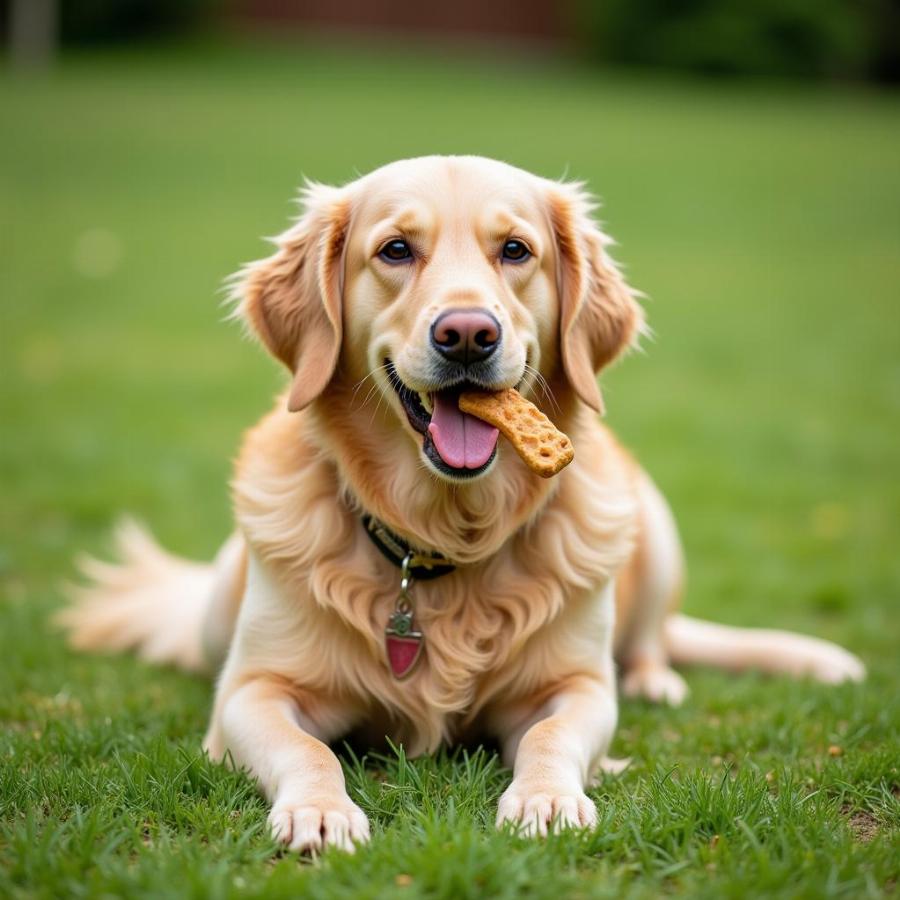Hot dog crisps – those crunchy, savory snacks that many of us enjoy – might seem tempting to share with our four-legged friends. But can dogs eat hot dog crisps? The short answer is no. While a small bite might not cause immediate harm, hot dog crisps are not safe for dogs and should never be a regular part of their diet.
Let’s delve into the reasons why hot dog crisps are a no-go for your canine companion and explore some healthy and delicious alternatives to keep those tails wagging.
Why Hot Dog Crisps Are Bad for Dogs
While we might find hot dog crisps delicious, their ingredients and nutritional profile make them unsuitable and potentially harmful to dogs. Here’s a closer look:
- High in Sodium: Hot dog crisps are notoriously high in salt, which can be detrimental to dogs. Excessive sodium intake can lead to dehydration, electrolyte imbalance, and even sodium poisoning in severe cases. Symptoms of sodium poisoning include vomiting, diarrhea, lethargy, tremors, and seizures.
- Unhealthy Fats: These snacks are often fried or cooked in oils that are high in saturated and trans fats. Just like in humans, these fats can contribute to weight gain, pancreatitis, and other health issues in dogs.
- Artificial Additives: Hot dog crisps are often loaded with artificial flavorings, colorings, and preservatives, many of which are not dog-friendly. Some of these additives can cause allergic reactions, digestive upset, or even have long-term health consequences for your furry friend.
- Onions and Garlic: Some hot dog crisps may contain onion or garlic powder, both of which are toxic to dogs. These ingredients can damage red blood cells and lead to a condition called hemolytic anemia.
- Choking Hazard: The shape and size of hot dog crisps can pose a choking hazard, especially for small breed dogs.
Healthy Snack Alternatives for Your Dog
Instead of reaching for those hot dog crisps, opt for dog-friendly treats and snacks that are both delicious and nutritious:
- Fresh Fruits and Vegetables: Many fruits and vegetables, such as apple slices (without seeds), carrot sticks, and blueberries, make excellent snacks for dogs.
- Plain Cooked Meat: Small pieces of cooked chicken, turkey, or beef (without any seasonings or sauces) can be a tasty and protein-rich treat.
- Commercial Dog Treats: Choose high-quality commercial dog treats that are specifically formulated for their dietary needs. Look for options with natural ingredients, limited additives, and a good balance of protein, fats, and carbohydrates.
Expert Insight: “Feeding your dog a balanced diet of high-quality dog food and healthy treats is crucial for their overall health and well-being,” says Dr. Emily Parker, a veterinarian with over 15 years of experience in small animal care.
What to Do If Your Dog Eats Hot Dog Crisps
If your dog accidentally eats a small amount of hot dog crisps, don’t panic. Monitor them closely for any signs of digestive upset, such as vomiting, diarrhea, or loss of appetite. If your dog shows any concerning symptoms, or if they have ingested a large quantity of hot dog crisps, contact your veterinarian immediately.
Tips for Safe Snacking
- Read Labels Carefully: Always check the ingredient list of any human food before sharing it with your dog, even in small amounts.
- Moderation is Key: Even with healthy treats, moderation is important. Treats should make up no more than 10% of your dog’s daily calorie intake.
- Consult Your Vet: When in doubt about whether a particular food is safe for your dog, always consult with your veterinarian.
 Dog Enjoying a Healthy Treat
Dog Enjoying a Healthy Treat
FAQs about Dogs and Human Food
Can dogs eat potato chips?
Just like hot dog crisps, potato chips are not recommended for dogs due to their high salt, fat, and artificial ingredient content.
What about other crunchy snacks?
It’s generally best to avoid giving dogs most crunchy snacks intended for humans, as they often contain similar unhealthy ingredients.
Are there any human snacks that are safe for dogs?
Yes, some human foods, such as plain cooked rice, plain yogurt, and certain fruits and vegetables, can be safe for dogs in moderation. However, always do your research and consult with your veterinarian first.
Keeping Your Furry Friend Safe and Healthy
Understanding what foods are safe and unsafe for our dogs is essential for their well-being. By making informed choices about their diet and snacks, we can help keep our canine companions happy, healthy, and by our sides for years to come.
Need more guidance on dog nutrition and care? Contact Beaut Dogs at [email protected] for expert advice and resources tailored to your furry friend’s needs. Beaut Dogs** is your one-stop resource for all things dog-related, providing reliable information and expert advice to help you provide the best possible care for your canine companion.